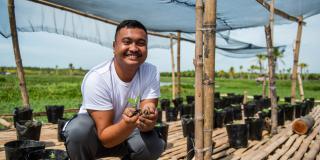
Food systems contribute to a third of greenhouse gas emissions, and in turn, climate change exacerbates hunger and food injustice.1 VSO is working to address these issues by promoting agroecology with smallholder farmers.
As a sustainable agricultural approach, agroecology integrates ecological and social principles to ensure food security, environmental sustainability, and rural development. With a network of partners and volunteers, VSO is helping to reshape a more socially responsible, inclusive, and climate-resilient food system, and enabling the most vulnerable to lead the change.
Over 72,000 smallholder and women farmers in Madhesh Province, Nepal, benefitted from the Right to Food Policy localization.
1,600 smallholder female farmers have been trained in agroecology tools and technologies in
Cox’s Bazar and Satkhira, Bangladesh.
800 farmers in Eswatini, Mozambique and Zimbabwe have improved their income and nutrition thanks to agroecology.
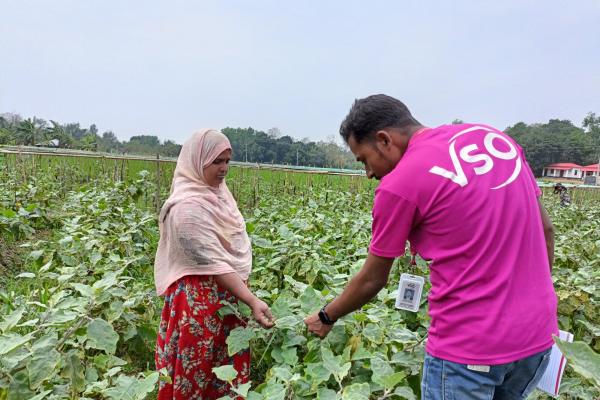
Working with women and youth in Bangladesh for a sustainable food system
In Bangladesh, agroecology is paving the way for a safer and more sustainable food system. This approach is empowering local communities, especially women smallholder farmers and youth, to boost their income, improve food security and reduce food waste. At the heart of this transformation is the Safe Food project funded by UK International Development, which since 2014 has equipped local communities from the Cox’s Bazar district with the skills and knowledge to transition towards agroecology.
Thanks to agroecology and mixed-farming practices, smallholder farmers are now cultivating a diverse range of high-value crops that are fresh, affordable and free from harmful chemicals. In turn, these nutritious vegetables are sold in markets run by women who have been trained in safe food production and handling, creating new economic opportunities and promoting food safety.
Volunteer youth clubs also play a key role in the project, running demonstration plots for farmers and leading food distribution networks, ensuring that safe, healthy food reaches even the most marginalised communities.
The initiative is not only enhancing food security but is also empowering women and youth with greater control over their income and productive resources, driving a more resilient and inclusive food system in Bangladesh.
Ensuring the right to food in Nepal
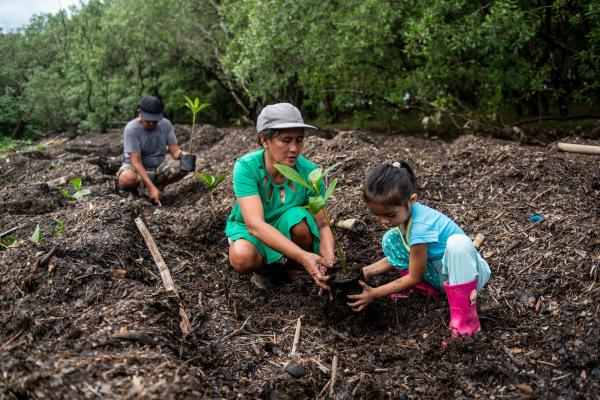
In Nepal, VSO is working hand in hand with local governments in Karnali and Madhesh provinces to realise the goals set forth in the 2018 Right to Food and Food Sovereignty Act. The Active Citizenship for Inclusive Volunteering and Empowerment (ACTIVE) programme, funded by UK International Development, focuses on enhancing food security and food sovereignty, enabling communities to produce and access the food they need for a healthy and sustainable life.
VSO works to ensure that local policies prioritise agroecology and inclusive livelihoods, aiming not only for environmentally friendly agricultural methods but also for the preservation of local ecosystems.
Central to the initiative is the support of women farmers, who are vital contributors to agriculture. The programme empowers them by introducing them to sustainable practices such as multi-cropping home gardens and organic pest control. Additionally, they receive economic support to undertake green initiatives, including the production of dishware made of leaves and the cultivation and processing of turmeric.
The programme also embraces innovative agricultural practices aimed at maximising resources and
productivity. One such practice is grey water management, which repurposes wastewater from
baths, laundry and kitchens. This technique, along with integrated hog and fish raising, offers significant benefits for waste management and increases overall productivity.
VSO has launched nutrition gardening initiatives involving mothers, successfully linking agroecology with health. By encouraging the cultivation of diverse, nutrient-rich gardens, these initiatives ensure that families have access to a variety of healthy foods, directly contributing to better nutrition and well-being.
Using agroecology to build trust among diverse communities in the Philippines
In 2019, after five decades of armed conflict, the Bangsamoro Autonomous Region in Muslim Mandanao (BARMM), in the Philippines, was born from a historic peace agreement between the government and Moro secessionists. This significant stride towards peace marked a new beginning, yet BARMM remains one of the poorest regions in the country, with 60% of its population living in poverty.2
Through the ACTIVE programme, VSO is working with communities in BARMM to promote civic engagement and empower them to take the lead in agroecology. biodiversity conservation and climate change adaptation, all aimed at creating sustainable livelihoods.
Through agroecology, the project supports ex-combatants, their families and internally displaced individuals by addressing their financial and food security needs during resettlement. Community volunteers have been crucial in promoting aqua-silviculture and eco-tourism initiatives to restore and protect the region's precious mangrove forests in different coastal villages. This aims to increase the community's resilience against the impact of climate change.
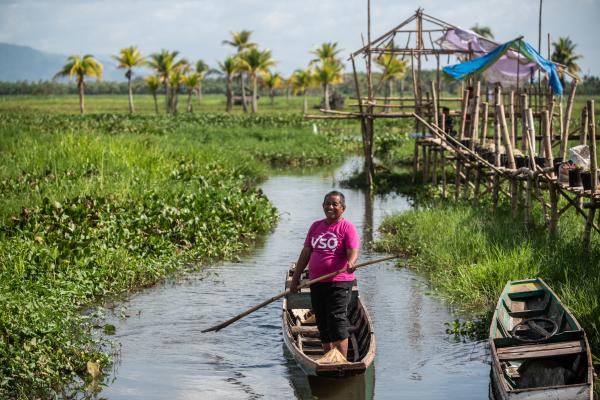
In this post-conflict society, VSO's initiatives do more than just protect vital ecosystems and biodiversity. They build bridges between Moro and Christian communities, fostering social cohesion and nurturing a future where both thrive peacefully together. Through facilitated communication and the exchange of skills and knowledge, people of different faiths are forging trusted relationships, cultivating a spirit of unity and collaboration.
The project has also achieved significant milestones, including the enactment of municipal ordinances to protect marine areas considered fish sanctuaries, mangrove forests and marshlands. Although still in early stages, agroecology has already shown its potential to sustain peace and support the long-term development of the area.
Salman’s journey: From guerrilla commander to VSO volunteer
Salman* is an ex-commander from the Moro Islamic Liberation Front (MILF) from BARMM, in the Philippines, who has embraced a new role as VSO volunteer, now managing an eco-tourism site. Through agroecology training, VSO helps ex-combatants like him and their families in accessing livelihood opportunities, building peaceful and resilient communities, and responding to environmental challenges.
Although the MILF forged a peace deal with the government in 2014, the peace in the area remains fragile. VSO’s work is crucial in fostering stability and growth in the region.
Transforming smallholder farmers’ lives in Eswatini, Mozambique and Zimbabwe
Agroecology is also transforming the lives of smallholder farmers in Eswatini, Mozambique and
Zimbabwe. By enhancing income, livelihoods and decision-making, agroecology is nurturing a brighter
future for these communities.
In Zimbabwe, under the ACTIVE programme, VSO volunteers are helping smallholder farmers advocate for policies that support agroecology, with a particular emphasis on indigenous seeds to enhance climate resilience and food security. Through collaboration with local partners, the project has successfully revived nearly extinct seeds, such as sesame.
Another example is ‘Svoboda’, an almost extinct local variety of barnyard millet known for its drought resistance. The local community has renamed it, replacing its English name, as part of their efforts to recover, celebrate and use indigenous farmers' seeds.
I thought only civil servants could earn money. Last season, I practiced intercropping of cowpeas and sorghum and I earned $550."Mai ManjokwiroSmallholder farmer in Chimanimani, Zimbabwe
Community activities like the 'Good Food Festival' and farmer field days also contribute to celebrating the importance of these indigenous seeds, fostering a sense of pride and sustainability.
VSO has also placed a national agroecology volunteer at the School of Agroecology in Shashe, Zimbabwe, who supported the rehabilitation works at the school. The volunteer has empowered more farmers to practice agroecology, farmer to farmer learning and encouraged them to participate in seed fairs, significantly boosting food security.
Partnerships have also been formed with organisations that provide training to government extension workers in agroecology and sustainable agriculture ensuring that these practices are widely adopted and sustained.
Given the similar cultural and environmental contexts, this successful model has been similarly implemented in parts of Mozambique and Eswatini, working with smallholder farmers in collaboration with the agriculture and environment ministries.
An agroecology champion
Valentine Maina is an agroecology champion and former VSO volunteer, now VSO staff working in the ACTIVE project in Kenya. In her role, she trains smallholder farmers on agroecology, focusing on water conservation, seed selection and storage and maintaining biodiversity. “I have seen agroecology work for them; they earn a living and take their kids to school. This is where my passion comes from,” she shares.
Footnotes
Stories
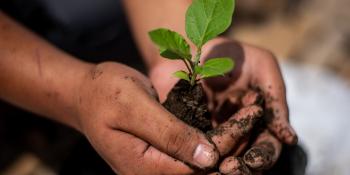
Six ways agroecology is improving food security in hunger hotspots
Pursuing agroecology in hunger hotspot countries is not only a viable strategy for improving food security, but an effective means of promoting water conservation.
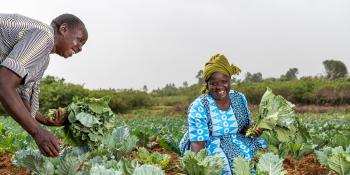
Why investing in small farmers and agroecology is critical in tackling the food crisis
Already battered by the climate crisis and COVID-19, Africa is now facing rising food prices in light of the war in Ukraine.
Pioneering the Path of Agroecology: The first VSO-led cross-country learning and partners exchange
In June 2024, VSO launched its first Cross-Country Learning and Partners Exchange, bringing together VSO project leaders and partners from Nepal and Zimbabwe to exchange best practices in small holder farmer agroecology.
